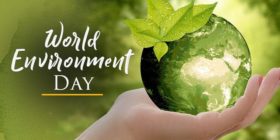There is no denying that the environment around us is constantly changing. However, with a massive increase in the influx of disasters – natural and man-made, there is an urgent need to become more aware, attentive and conscious of the types of environmental problems our planet is facing and take measures to combat them immediately.
Across the world, concern is mounting over an ever growing list of environmental problems. Evidence suggests that people are consuming far more natural resources than the planet can sustainably offer. The wellbeing of humanity, the environment and world economies ultimately depends on the judicious use of resources. Hence, we need a promising strategy, within planetary boundaries, to ensure a brighter and safe tomorrow.
Among the uncountable environmental problems that exist, water and air pollution are the gravest of them all. According to the WHO, there have been 8 million premature deaths in 2012 because of poor air quality, making air pollution one of the world’s single largest environmental health risks. Out of which, 4.3 million deaths could be directly attributed to indoor air pollution.
On this World Environment Day, let’s take small but impactful steps to make this world a better place for ourselves, our children and the generations to come. Marzin Shroff from Eureka Forbes Limited shares tips that will help us make the world a better place to live in.
1. Conserve energy! Turn off lights and appliances when not in use.
2. Say no to plastic bags when you shop. Use cloth bags instead.
3. Don’t keep the tap running while you brush your teeth. This can save you as much as 11 litres every time!
4. Check for tap leakages. This can save 24 litres of water.
5. Instead of pouring used water from pets’ bowls or running showers down the drain, capture the water and use it to water your plants.
6. Did you know your water purifier could be responsible for wastage of water? For 1 glass of drinking water, RO technology uses 7 glasses of water. Using incorrect purification techniques like RO in places where TDS is below 200ppm could result in the consumption of distilled water that is detrimental to health. Thus it is of prime importance to use the right technology for purification so that all the essential minerals present in water are retained.
7. Wash your fruits and vegetables in a pan of water instead of running water from the tap. Collect the water you use for rinsing fruits and vegetables, and then reuse it to water your plants.
8. Gray water that is not fit for human consumption can be used for gardens or plants around house.
9. Gray water from the bathroom sink can be directed towards the toilet tank, as it’s not necessary to flush a toilet with clean water.
10. Rainwater harvesting is an easy solution for the acute crisis of water shortage in urban areas. Put simply, the rain water that falls on rooftops can be stored in tanks, wells etc. and re-used.
11. Instead of using vehicles to travel short distances, walk the distance or try carpooling options.
12. Whenever possible, minimise your use of air conditioners. They lead to heavy wastages of electricity and energy.
13. In order to keep the air fresh within the confines of your house, try installing a good quality air purifier with a high efficiency particulate air filtration (HEPA) filter. This will trap small particles and pollutants, thereby significantly improving the air quality and therefore the environment.
14. Club your work – hit the post office, grocery store and library in one trip. It will save you gas, time and effort.
15. We often wash our clothes in the machine when there is only a handful of dirty laundry. Instead, run the machine only once you collect a bag full of clothes.
16. We buy more than we need. The problem with growing purchasing power parity and aspirational values is that we buy more, use less and need the items even lesser.
17. Instead of paper bills and statements every month, switch to e-statements and e-bills.
18. Reduce your usage of chemicals and pesticides in everyday functioning.
19. Opt for more local, organic and seasonal food.
20. Most importantly, plant a tree with your friends or family on this World Environment Day!





Leave a reply